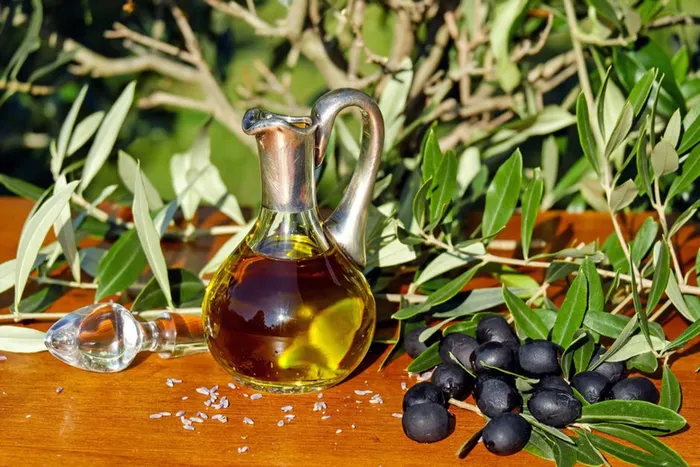Olive oil big part of healthy diet

JUG OF THE GOOD STUFF: The healthiest olive oil money can buy costs, but it’s worth every rand. JUG OF THE GOOD STUFF: The healthiest olive oil money can buy costs, but it’s worth every rand.
Whether you use it for cooking or as as part of your health and beauty routine, adding olive oil to your shopping list is a must. Extra virgin olive oil is made by crushing olives and extracting the juice without using added chemicals. According to oliveoiltimes.com, extra virgin olive oil “is the highest quality and most expensive olive oil classification”.
It continues: “It’s not easy to produce extra virgin olive oil.
“A producer must use fresh olives in good condition and monitor every step of the process with great care. Extra virgin olive oil doesn’t stay that way: even in perfect storage conditions the oil will degrade over time, so it’s important to enjoy it within its two-year shelf life.”
In the crest of the Helshoogte Pass between Stellenbosch and Franschhoek is the home of Tokara Olive Oil. Tokara also produces wines and pot still brandy.
Said Tokara operations manager Gert van Dyk: “There is a theory about the shelf life of cloudy (unfiltered) olive oil being shorter. However, as long as it’s kept in good storage conditions it should be fine.
“At Tokara we store it for as long as possible in a tank controlled environment, then we put it in the polishing system. After two months it usually settles.”
In explaining the process, Van Dyk said: “We have taken the olive from the tree, in its freshest state, and we made the oil from it, that that is what makes it an extra virgin.
“The oil is unadulterated, there is nothing else added to it and nothing else taken away, just the oil from the olives.
“The second part of the olive oil, which is compulsory, is that there can be no other smells and bad tastes, nothing other than the taste and smell of olive.”
But how do you know if what you are tasting is olive oil in its purest form?
“When you taste the oil there will be no oily taste lingering in your mouth - that is how you know that it is extra virgin olive oil.
“You get three types of intensities with extra virgin olive oil. There is the intense fruitiness - it has the fruity flavours from the olive. Then there is the pepperiness, which causes a slight burn in the back of the throat. And then there is the bitterness, which you will taste on your tongue.
“It is also important to note that extra virgin olive oil is one of the most stable fat components once heated, so it is great for cooking, not just as a salad dressing.”
But, as Van Dyk explains, to ensure you get the best out of your extra virgin, it is best to keep the heat under 220ºC.
“When you heat olive oil, you preferably don’t want to go over 210-220ºC, that is where the smoking point is and it is where the oil becomes unstable.
“Anything below that, for perhaps a roast or a sauce, will work just fine.”
Speaking about its health benefits, Van Dyk said extra virgin olive oil was a better alternative than other oils.
“There have been a lot of articles written and studies done on the benefits of extra virgin olive oil, and people regularly refer to the healthy Mediterranean diet that consists mainly of fresh olive oil, fruit, vegetables and seafood.
“In the end, no matter where you are from, it is all about balance, and not increasing the total number of calories you eat.
“If you are healthy, 1-2 tablespoons of extra virgin olive oil a day will certainly do you good.”
“When talking about the health benefits of olive oil it is important to refer to extra virgin olive oil, as this is the purest juice from the olive, unblended with other oils and it has a high percentage of polyphenols.”
Polyphenols are compounds that are a powerful tool in the body’s internal anti-ageing process and can assist in the fight against many illnesses.
“These oils are also rich in monounsaturated fats, which increase good and reduce bad cholesterol, and contain anti-oxidants.
“They contain vitamin E, and tests prove that including olive oil in your diet reduces the risk of breast cancer by 60% and reduces secondary heart attacks by 48%.
“If you find a boutique local producer, you understand their production process and you can buy the freshest oil from them, you will never go wrong.”